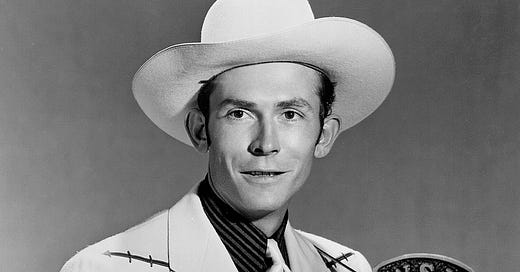The Mysteries of History (June 11 Edition)
Hank Williams at the Grand Ole Opry; Massive Car Race Crash
1949 — Hank Williams Plays the Grand Ole Opry for the First Time
public domain images
On this date in 1949, twenty-five year old singer-songwriter Hank Williams (1923-1953) played the Ryman Auditorium (the “Grand Ole Opry” venue) for the first time. He was yanked back onstage six times by the audience clamoring for encores. It only ended after six due to the “show needing to go on” (allowing the other acts time to perform).
The original Hank Williams (there is a Jr. [no slouch as a songwriter himself] and a “The Third” in the family line) had his first hit record two years earlier, in 1947, “Move It On Over” (hence covered by, among others, George Thorogood and the Delaware Destroyers).
Williams had been given the stiff-arm by the Grand Ole Opry because of his problematic drinking, but had appeared on the Opry’s competition, The Louisiana Hayride. Due to his huge hit Lovesick Blues in 1949, though, the Opry’s powers that be decided to give Williams a chance. He was a part of the GOO for three years but was then fired in 1952 for his heavy alcohol abuse; he died the next year from health issues related to that addiction.
In my opinion (whose else would I give?), Williams was one of the best American songwriters ever. He once said that if it took him longer than 15 minutes to write a song, he gave up on it, as that meant it was too complicated. Here’s a list a few of his top songs (in addition to the two already mentioned): Cold, Cold Heart; Hey, Good Lookin’; Jambalaya (On the Bayou); Kaw-Liga; Take These Chains from My Heart; and, last but ot least, Your Cheatin' Heart.
Popular and themselves-influential artists from various musical genres who were influenced by Williams include Elvis “The Pelvis” Presley, the Beatles, Bob Dylan, Merle Haggard (also one of the all-time best American songwriters), and many others.
Questions: What is your favorite Hank Williams song? Do you think the Grand Ole Opry was right in allowing Williams to play their venue due to his increased popularity? Were they right in firing him three years later? What could have been done to help Williams, if anything?
1955 — 83 Spectators Killed at a Car Race
public domain image
Speed kills sometimes (but as is brought out in Wolfgang Langewiesche’s Stick and Rudder, speed [and height] actually equate to safety when it comes to flying), and it’s not just the people traveling overly fast who die in each case.
On this date in 1955, eighty-three spectators lost their lives (and hundreds of others were injured) during the Le Mans (France) 24-hour endurance auto race when an out-of-control car smashed into the grandstands. The driver also died.
Despite the horrific fiery accident, the race continued, ostensibly because if the crowds had all left at the same time, those leaving would have blocked the incoming ambulances from arriving.
Originally only one driver was allowed to drive each car in the Le Mans race; later, the number of drivers doubled to two; three drivers are now not only allowed, but required.
Questions: Have you ever been to a car race? Do you watch them on tv? Do you know anybody who has raced cars for a living? (I have known two: a neighbor in Eureka, California in the early 60s [Tommy’s dad], and a couple of decades later Ed “Eddie” Wendt, who had been a “Midget Car” driver in the Stockton, California area during the 1940s)






